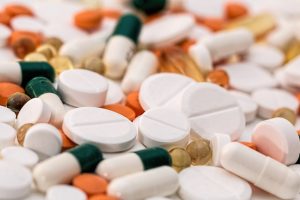By nature, our cells fight against microbes that enter our body, and this is frequently demonstrated by the formation of pus and inflammation of the sores. However, microbes could adapt and undergo genetic mutations quickly, resulting in opportunistic infectious diseases, such as HIV. On the contrary, microbes can also help us in the way the “good bacteria” lactobacilli work in our digestive system.
 Pharmaceutical industry
Pharmaceutical industry
Understanding the principles of microbiology and the mechanisms of human cells allows pharmacists to discover antimicrobial drugs that would be used against an increasing number of communicable diseases. Pharmacists and microbiologists work together to ensure that drug therapies target opportunistic microbes without harming the human host. Another important role in pharmaceuticals is the use of microbes for medically important studies, such as Bacteriorhodopsin, a protein from the plasma membrane of Halobacterium salinarum.
Medical equipment
Microbiology plays an important role in medical devices, such as fluorescence fusion, which are used for the rapid and precise detection of pathogens in tissue samples. It is a technology to perform immunofluorescence studies that can be applied to find specific cells in complex biological systems.
Cosmetic microbiology
According to International Microbiology, microbial contamination of cosmetic products is very important for the industry and can become a major cause of product loss and economic loss. In addition, contamination of cosmetics can lead to their conversion into dangerous products for consumers. The water and nutrients in cosmetics make them susceptible to microbial growth, although only a few cases of human injury from contaminated cosmetics have been reported. More often, microorganisms are the cause of organoleptic changes, such as unpleasant odors, and changes in viscosity and color.…
